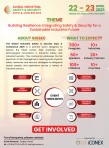- AAFT School of Hospitality and Tourism Showcases Iranian Cuisine at the 17th Global Film Festival
- AI is an Enhancement, not a Challenge: Insights from MIT-WPU’s CXO-Entrepreneurs Alumni Meet 2024
- Ace Therapeutics Accelerates Preclinical Depression Investigation by Providing Depression-Related Behavior Tests
- India at Work 2024 Report by Apna.co reveals over 7 crore job applications, 12 lakhs jobs posted in 2024
- Geetanjali International Foundation Celebrates the 5th Edition of Sant Shiromani Surdas Mahotsav
- Euro Energy Resources Limited Announces New Medical Battery Solutions in Leicester
- Matrimony.com announcing the launch of a new specialised service, Make My Wedding
- Hyatt Jaipur Malviya Nagar Rings in 2024 with Dazzling Disco Night
- Relaxo Launches 'Festive Fiesta Offer' with Big Savings on Footwear Across Brands
- Style Condoms Unveils New Identity with #StyleHarBaar Campaign and Three New Condoms
- Softflix IT Solutions Celebrates 3rd Anniversary
- Lay’s Brings Its Iconic Flavours to Delhi’s Streets with an Exciting Food Truck Experience
- Sandeep Marwah Honored by Namo Gange at the 17th GFFN for Promoting Love, Peace, and Unity
- AAFT School of Hospitality and Tourism Showcases Moroccan Cuisine at 17th Global Film Festival
- The Leela Hyderabad Celebrates Christmas with Exquisite Dining Experiences
 Mail to a Friend Mail to a Friend |
|
     |
Study Links Proton Pump Inhibitors to Increased Risk of Dementia
Parker Waichman LLP, a national law firm dedicated to protecting the rights of victims injured by defective drugs and medical devices, is commenting on the findings of a new study involving proton pump inhibitors (PPIs). The study, published online February 15, 2016 in JAMA Neurology, revealed that PPI use was associated with a higher risk of dementia in patients studied in Germany. PPIs are medications used to treat upper gastrointestinal conditions such as heartburn and peptic ulcers. Novartis' Prevacid and AstraZeneca's Nexium and Prilosec are three popular PPIs. http://archneur.jamanetwork.com/article.aspx?articleid=2487379
The study was conducted using data from Allgemeine Ortskrankenkassen (AOK), Germany's largest statutory health insurer, between 2004 and 2011. Researchers analyzed medical records of over 73,000 patients age 75 and older; 2,950 were regular PPI users. Regular PPI use includes individuals who had at least one prescription for one of the drugs every four or five months over a year and a-half. The researchers discovered 29,510 people who developed dementia during the study period and that regular PPI use was associated with a 44 percent increased risk of dementia compared to patients not taking PPIs. The authors concluded that, The avoidance of PPI medication may prevent the development of dementia. This finding is supported by recent pharmacoepidemiological analyses on primary data and is in line with mouse models in which the use of PPIs increased the levels of -amyloid in the brains of mice. Randomized, prospective clinical trials are needed to examine this connection in more detail.
According to Reuters Health, the senior author of the study, Britta Haenisch of the German Center for Neurodegenerative Diseases in Bonn, Germany, said that physicians should make an effort to not over-prescribe PPIs, something that occurs frequently. "PPIs used for the treatment of gastroesophageal [reflux] disease and peptic ulcers work by reduction of gastric acid production," Haenisch told Reuters. "The underlying mechanism by which PPIs might influence cognition is yet to be determined." She noted that, "Patients should take the drugs according to their doctor's instructions¦. To evaluate cause and effect relationships between long-term PPI use and possible effects on cognition in the elderly randomized, prospective clinical trials are needed." (http://www.aol.com/article/2016/02/16/gastric-reflux-drugs-may-be-tied-to-dementia-risk/21313375/)
Parker Waichman comments that patients and health care professionals may help prevent drug-related injuries by staying up-to-date with current medical research findings. According to this study, patients taking PPIs may be more likely to suffer from dementia, said Matthew J. McCauley, Senior Litigation Counsel at the firm. These findings, along with other studies, may affect the way doctors prescribe PPIs.
Parker Waichman LLP offers free legal consultations to victims of PPI side effects. Please [contact the firm by visiting the firm's PPI Injury page](http://www.yourlawyer.com/topics/overview/proton_pump_inhibitors). Free case evaluations are also available by calling 1 800 LAW INFO (1-800-529-4636).
Company :-Parker Waichman LLP
User :- Parker Waichman
Email :-prc.pressagency@gmail.com
Phone :-516--46-6-6500
Mobile:- -
Url :- http://www.yourlawyer.com/long-island










